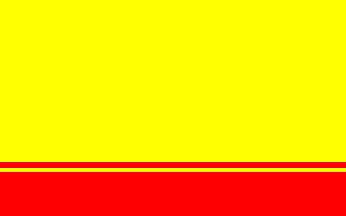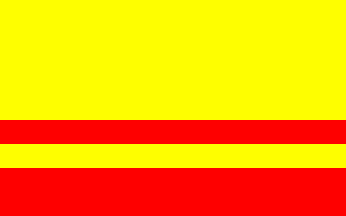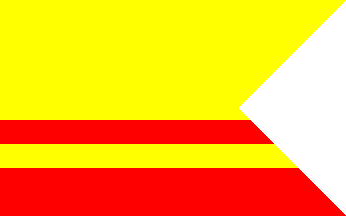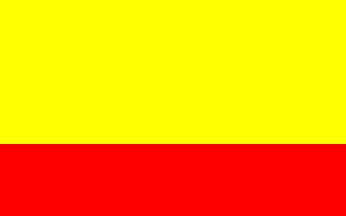
Last modified: 2013-12-09 by zoltán horváth
Keywords: simplification | chuvash |
Links: FOTW homepage |
search |
disclaimer and copyright |
write us |
mirrors
These variations consist of diverse degrees of
simplifying of the real flag. I’m sure these “evolved”
from using in a flag fashion pieces of “chuvash bounting”
(the stripes of the national flag in a ribbon or scroll,
often embellishment in local coats of arms and logos).
Please note that these patterns were actually witnessed
being used as flags, both in real (usually paper hand wavers
or metal roof and pole top ornaments), and in flat flag
depictions on outdoor advertisement and similar public
media. All these images were made using the official ratio,
however simplifications are simple by nature, and 2:3 or
1:2 might be also in use.
António Martins, 01 Aug 1999

This is like the normal flag but only with the stripes (lacking
the tree and the suns). Surprisingly enough, this one is quite rare.
António Martins, 01 Aug 1999

This one further simplifies, showing the stripes
in wider, more distinct, dimensions: Y5R1Y1R2. This
is probably the most usual variation.
António Martins, 01 Aug 1999

This is like the previous, but in
a swallowtailed fashion — clearly the re-usage of an
end of bounting. Found in the quite ubiquous logo of a
local factory.
António Martins, 01 Aug 1999

This is a simple yellow over red bicolor, with the red
stripe as 1/3rd of the hoist. This one shows almost always
in conjunction with the russian flag,
simplified to match it’s lower stripe.
An even more radical simplification would be a bicolor with equal stripes,
but I never seen it. I guess the idea of a yellow field with a red stripe
at the bottom (the basic description of the chuvash flag) would not resist
such a simplification.
António Martins, 01 Aug 1999